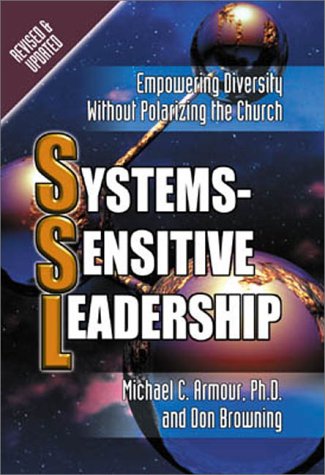Michael Armour and Don Browning, Systems-Sensitive Leadership: Empowering Diversity Without Polarizing the Church. 2nd edition. College Press Publishing Company, 2000.
Referenced in: Change Concepts and Theories
LifeandLeadership.com Summary
Armour and Browning apply the Gravesian Theory of Intrapersonal Systems, named after the late Dr. Clare W. Graves, who before his death in 1986 taught at Union College in New York. They describe eight distinct systems that shape values and account for much of our diversity in human community. These “systems within us” have an immense bearing on the “systems between us.” Differences in our intrapersonal systems conspire to create problems in the interpersonal systems of our churches.
The theory suggests that as we experience life individually, we encounter increasing degrees of complexity that require adjustments to our way of thinking. We move to new “systems” of thinking that alter our views of life, security, significance, family, spirituality, learning styles, likes, dislikes, etc. (these “systems” are numbered 1-8). If the system we are in helps us make sense of what we encounter, then our lives are balanced and we do not move to a new system of thinking. But as complexity increases, whether through challenging life hcircumstances or the broadening of education, travel, diverse communities, etc., these new realities may overwhelm our current way of viewing the world. We thus have to revise our models, our intrapersonal systems, to integrate the new. We continue to modify our intrapersonal systems until we either find life contexts that are stable enough not to upset our core, or until we reach such a balance point that we no longer feel compelled to adjust to our surroundings. The authors suggest that our churches often experience the clashing of systems 4, 5, and 6. This clash is at the core of many of our differences concerning styles of worship, leadership, learning, relating, and achieving significance.
This book is dense, and it is not the place to start in knowing how to manage congregational diversity. But those who read it will never see life or church in quite the same way. It provides a much deeper understanding into why some people want change and some resist it, and how churches with members from competing systems can thrive as diverse communities.
From the Publisher
God demonstrated his creativity even in our personalities. People view events from different perspectives and presuppositions. Whether it is conflict resolution, goal achievement, or completing a specific task, a systems-sensitive leader will be able to recognize the differences in people and help them to work together toward common objectives. This is a must read book for anyone involved in church or business leadership.
About the Author
For over 30 years Dr. Mike Armour has helped leaders and executives perfect their professional skills, attain peak performance, and discover new dimensions of satisfaction and fulfillment.
***For additional information on this resource, including reviews, click the bookstore links. Check the reference at page top or the links below for resource guides on related topics.***
Related Areas
See Other Resources on Change and Transition in Churches:
- Change and Transition in Churches, Intro
- Change Concepts and Theories
- Change Receptiveness and Resistance
- Leading Change and Transition
See Resource Guides on Over 100 Areas of Ministry Leadership:


